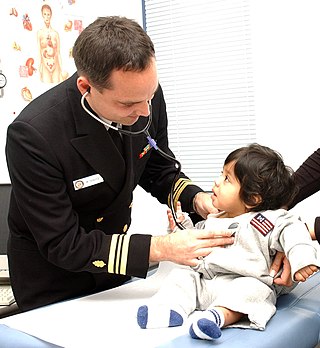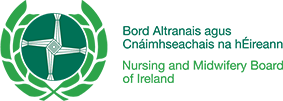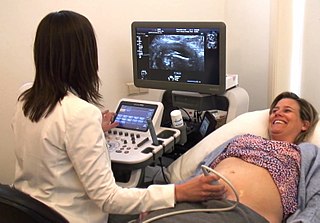Related Research Articles

A registered nurse (RN) is a nurse who has graduated or successfully passed a nursing program from a recognized nursing school and met the requirements outlined by a country, state, province or similar government-authorized licensing body to obtain a nursing license. An RN's scope of practice is determined by legislation, and is regulated by a professional body or council.

The Nursing and Midwifery Council (NMC) is the regulator for nursing and midwifery professions in the UK. The NMC maintains a register of all nurses, midwives and specialist community public health nurses and nursing associates eligible to practise within the UK. It sets and reviews standards for their education, training, conduct and performance. The NMC also investigates allegations of impaired fitness to practise.
The Health and Care Professions Council (HCPC), formerly the Health Professions Council (HPC), is a statutory regulator of over 280,000 professionals from 15 health and care professions in the United Kingdom. The Council reports its main purpose is to protect the public. It does this by setting and maintaining standards of proficiency and conduct for the professions it regulates. Its key functions include approving education and training programmes which health and care professionals must complete before they can register with the HCPC; and maintaining and publishing a Register of health and care providers who meet predetermined professional requirements and standards of practice.

A nurse practitioner (NP) is an advanced practice registered nurse and a type of mid-level practitioner. NPs are trained to assess patient needs, order and interpret diagnostic and laboratory tests, diagnose disease, prescribe medications and formulate treatment plans. NP training covers basic disease prevention, coordination of care, and health promotion.
An Associate of Science in Nursing (ASN) is a tertiary education nursing degree which typically takes 2–3 years to complete. In the United States, this type of degree is usually awarded by community colleges or similar nursing schools. Some four-year colleges also offer this degree. Students awarded an Associate of Science in Nursing are qualified to sit for the NCLEX-RN and apply for licensure as a Registered Nurse.
Nursing in the United Kingdom is the largest health care profession in the country. It has evolved from assisting doctors to encompass a variety of professional roles. Over 700,000 nurses practice, working in settings such as hospitals, health centres, nursing homes, hospices, communities, military, prisons, and academia. Most are employed by the National Health Service (NHS).
Sylvia Ernestine Denton (1941-2020), CBE, FRCN. RHV. Denton was one of the first Breast Care Nurses in the United Kingdom and President of the Royal College of Nursing from 2002-2006.

Nursing in Australia is a health care profession. Nurses and midwives form the majority (54%) of Australian health care professionals. Nurses are either registered or enrolled. Registered nurses have broader and deeper education than enrolled nurses. Nurse practitioners complete a yet higher qualification. Nurses are not limited to working in hospitals, instead working in a variety of settings. Australian nurses are in demand as traveling nurses, particularly those with advanced qualifications.
Frontier Nursing University is a private graduate school of nursing in Versailles, Kentucky. It was established by the Frontier Nursing Service in 1939 as the Frontier School of Midwifery and Family Nursing.
The Health and Social Care Select Committee is a Departmental Select Committee of the British House of Commons, the lower house of the United Kingdom Parliament. Its remit is to examine the policy, administration and expenditure of the Department of Health and Social Care (DHSC) and its associated agencies and public bodies. The Clerks of the Committee are Previn Desai and Joanna Dodd.

The Nursing and Midwifery Board of Ireland (NMBI), formerly called An Bord Altranais, is the Regulator for the professions of nursing and midwifery in Ireland. It has a statutory obligation to protect the public and the integrity of the practice of the professions of nursing and midwifery. It performs its functions in the public interest under the Nurses Act, 1985 and the Nurses and Midwives Ac, 2011.

The Queen's Nursing Institute (QNI) is a charity that works to improve the nursing care of people in their own homes in England, Wales, and Northern Ireland. It does not operate in Scotland, where the Queen's Nursing Institute Scotland performs a similar function. The QNI is also affiliated to the Queen's Institute of District Nursing in Ireland. The QNI is a member of the International Council of Nurses.
The Australian College of Nursing (ACN), formed in 2012 from a merger of the Royal College of Nursing, Australia and the College of Nursing, is the professional body for nursing in Australia. ACN advocates, develops policy, and provides education to advance the status of nursing nationally and internationally.

Nursing is a health care profession that "integrates the art and science of caring and focuses on the protection, promotion, and optimization of health and human functioning; prevention of illness and injury; facilitation of healing; and alleviation of suffering through compassionate presence". Nurses practice in many specialties with varying levels of certification and responsibility. Nurses comprise the largest component of most healthcare environments. Shortages of qualified nurses are found in many countries.
Nursing is a regulated profession in the Republic of Ireland. The Nursing and Midwifery Board of Ireland (NMBI) is the statutory regulator responsible for regulating both nursing and midwifery.

The General Chiropractic Council (GCC) is an independent statutory body established by Parliament to regulate the chiropractic profession in the United Kingdom. It protects the health and safety of the public by ensuring high standards of practice in the chiropractic profession.

A midwife is a health professional who cares for mothers and newborns around childbirth, a specialization known as midwifery.
Project 2000 was a higher education scheme in the United Kingdom for nursing qualifications, introduced in 1990 by the United Kingdom Central Council for Nursing, Midwifery and Health Visiting (UKCC), later the Nursing and Midwifery Council (NMC). The development was led by Margaret Dorothy Green.
Charlotte McArdle is the Chief Nursing Officer for Northern Ireland. She began her nursing training at Beaumont Hospital in Dublin in 1988, qualifying in 1991. Her career has seen her work in both the Republic of Ireland and Northern Ireland. She was appointed as Chief Nursing Officer by the Department of Health in 2013, and has served in that role during the COVID-19 pandemic.
References
- ↑ "Northern Ireland Practice and Education Council for Nursing and Midwifery". Northern Ireland Practice and Education Council for Nursing and Midwifery. 2024. Retrieved 10 July 2024.
- ↑ "Provide Advice, Guidance and Information on Best Practice and Matters relating to Nursing & Midwifery – Previous Work". Northern Ireland Practice and Education Council for Nursing and Midwifery. 2024. Retrieved 10 July 2024.